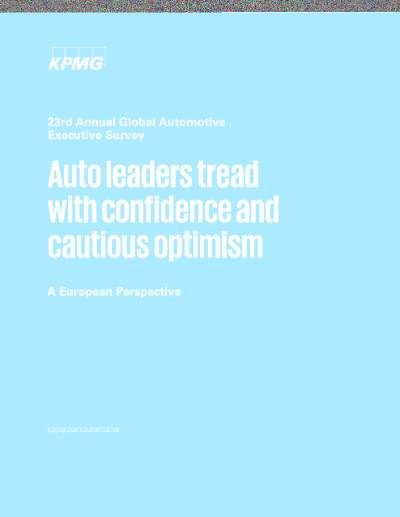The 23rd edition of KPMG's Global Automotive Executive Survey provides readers with a distinct perspective on the many forces shaping the future of automotive industry. More than 900 executives in 30 countries expect to see a sweeping transformation of the sector in the next 5 to 10 years. Business optimism remains high regarding profitable growth compared to last year, as COVID-19 and semiconductor shortage issues have somewhat eased. However, concerns remain in the form of high interest rates, energy prices and inflation rates, that can affect vehicle demand adversely.
Among the biggest trends relevant to Europe, is the compliance with evolving emissions regulations and ESG legislations - given EU's net zero ambition to be achieved by 2050, and the ban on petrol and diesel vehicles by 2035. In line with this, launching more electric vehicles (EVs) along with a supporting EV charging infrastructure network remains the most straightforward option for automakers. However, global executives believe that by 2030, the share of Battery Electric Vehicles (BEVs) in Europe will be 24 percent (as percent of new vehicle sales) - a major dip from the sentiment displayed in 2021 which betrays a hint of realism. The good news is most global and European executives (and a higher percentage than that in 2021) believe in widespread adoption of BEVs without government intervention - exhibiting immense confidence in their own capabilities and consumer demand to ride the vehicle electrification wave. But the jury is still out on the insufficient and unevenly distributed EV charging infrastructure which can support such high growth of EVs within Europe.
Most European and Global executives also foresee that a majority of new vehicle purchases will be completed online by 2030, but the percent of new cars sold directly to end-consumers is expected to be evenly split between Automakers (D2C), Auto dealerships and Digital retail platforms. These vehicle purchase decisions will be highly influenced by “Brand & image”, “Data privacy & security” and “Driving performance” rather than “Seamless & hassle-free experience”. Especially w.r.t “Data privacy & security”, 40 percent of European executives believe that consumers will trust automotive OEMs the most to safeguard their vehicle data. Automakers are also focusing on subscription services and 62 percent of executives are confident that consumers would be willing to pay for these monthly subscriptions.
More than half of European (and global) executives are also concerned about a range of issues affecting the supply chain, including the price volatility and availability of semiconductors, steel, rare earth metals and other specialty materials. Enabling “Circular Economy” for both EVs and EV batteries can, to a certain extent, resolve this supply chain issue related to critical materials. A higher percentage of executives (than that in 2021) also believe that cost and complexity of tariffs, trade rules and regulations will significantly increase in the next 5 years. To tackle these issues, a majority of executives believe in “Financial hedging”, “Direct investments in suppliers/JVs”, “Direct sourcing of raw materials”, and “Internalizing more production” as the top solutions, though close to two-thirds of them also believe in “Re-shoring” or “Dual-sourcing” to make supply chains less vulnerable.
KPMG continues to foresee intense competition and cooperation between traditional automotive players and new entrants as well as higher investments in the areas of new powertrains, advanced batteries, new digital technologies, battery reuse/recycle, and autonomous/connected vehicles. Given this impending disruption from new automakers and start-ups, how will traditional OEMs and suppliers compete? KPMG believes that many automakers and suppliers will divest non-strategic assets, do more M&A activities, tie-up with tech companies/start-ups, focus on contract manufacturing, and raise cash to invest in new technologies.
As the powerful convergence between automotive and technology sectors unfolds and pounds on the doors of automakers and suppliers, every facet of automotive -- from product development, to manufacturing, to supply chains and the customer experience - will undergo profound changes. But there will always be regional or country-level variations in terms of the intensity and timing of these impacts. For a more detailed view, we would advise readers to visit our website to interact with the data and view graphical results by region, country, company type and size, and respondent title.
Finally, the profound changes in the macroeconomic factors and geopolitical front continue to force automakers and suppliers globally to make their business strategies and business models more flexible and agile. And Europe is no exception to this. While there are no clear, sure-shot answers to the many dilemmas that automakers are facing today, we believe that the insights presented in this study can at least serve as a ready reckoner and eye-opener for all.






